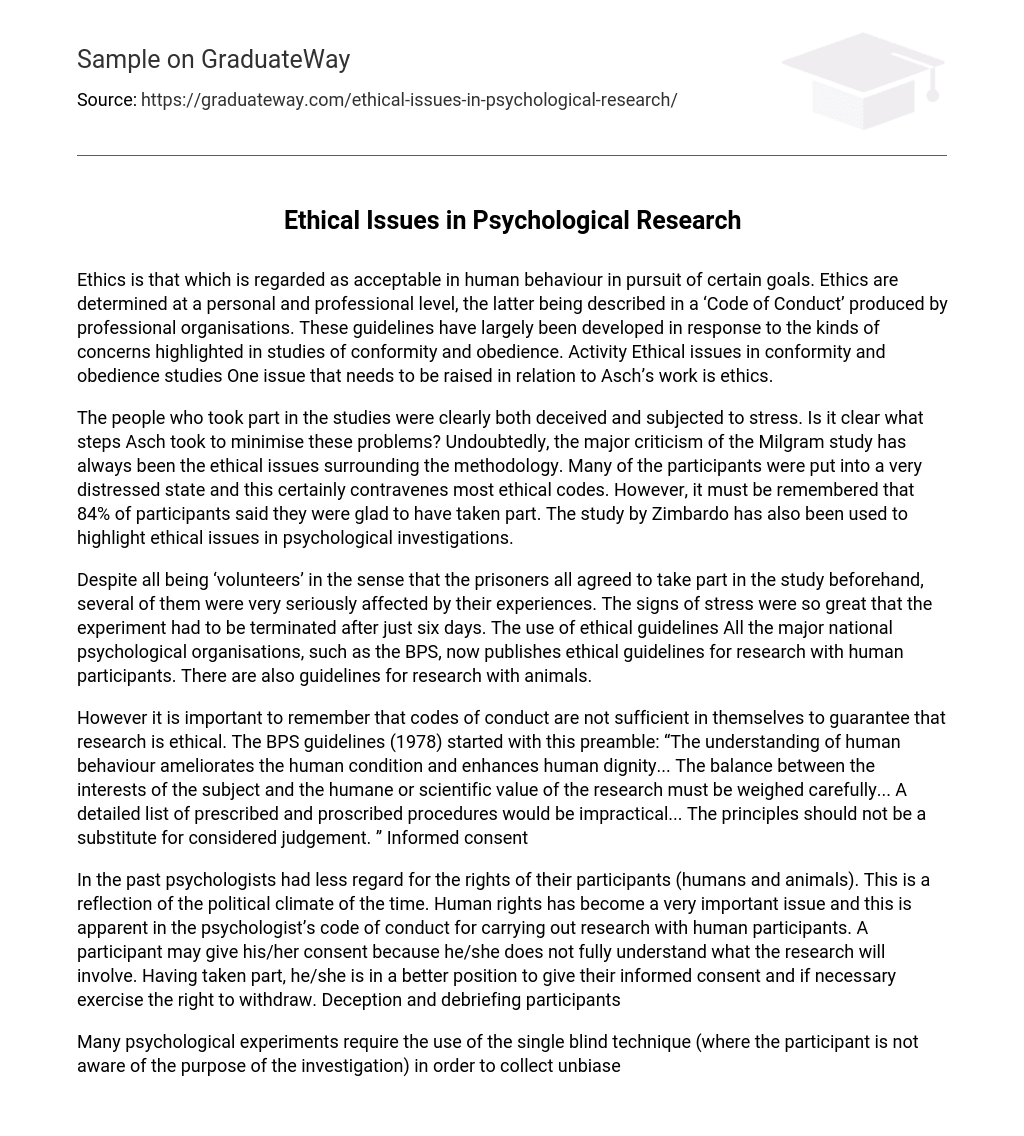Ethics is that which is regarded as acceptable in human behaviour in pursuit of certain goals. Ethics are determined at a personal and professional level, the latter being described in a ‘Code of Conduct’ produced by professional organisations. These guidelines have largely been developed in response to the kinds of concerns highlighted in studies of conformity and obedience. Activity Ethical issues in conformity and obedience studies One issue that needs to be raised in relation to Asch’s work is ethics.
The people who took part in the studies were clearly both deceived and subjected to stress. Is it clear what steps Asch took to minimise these problems? Undoubtedly, the major criticism of the Milgram study has always been the ethical issues surrounding the methodology. Many of the participants were put into a very distressed state and this certainly contravenes most ethical codes. However, it must be remembered that 84% of participants said they were glad to have taken part. The study by Zimbardo has also been used to highlight ethical issues in psychological investigations.
Despite all being ‘volunteers’ in the sense that the prisoners all agreed to take part in the study beforehand, several of them were very seriously affected by their experiences. The signs of stress were so great that the experiment had to be terminated after just six days. The use of ethical guidelines All the major national psychological organisations, such as the BPS, now publishes ethical guidelines for research with human participants. There are also guidelines for research with animals.
However it is important to remember that codes of conduct are not sufficient in themselves to guarantee that research is ethical. The BPS guidelines (1978) started with this preamble: “The understanding of human behaviour ameliorates the human condition and enhances human dignity… The balance between the interests of the subject and the humane or scientific value of the research must be weighed carefully… A detailed list of prescribed and proscribed procedures would be impractical… The principles should not be a substitute for considered judgement. ” Informed consent
In the past psychologists had less regard for the rights of their participants (humans and animals). This is a reflection of the political climate of the time. Human rights has become a very important issue and this is apparent in the psychologist’s code of conduct for carrying out research with human participants. A participant may give his/her consent because he/she does not fully understand what the research will involve. Having taken part, he/she is in a better position to give their informed consent and if necessary exercise the right to withdraw. Deception and debriefing participants
Many psychological experiments require the use of the single blind technique (where the participant is not aware of the purpose of the investigation) in order to collect unbiased data. This poses ethical problems for the researcher who must defend the design in terms of means versus ends. Gamson et al. (1982) used the following technique to avoid deceiving their participants but at the same time being able to use a single blind design. When participants volunteered, they were asked if they would take part in any of the following studies: •Research in brand recognition of commercial products. Research on product safety. •Research in which you will be misled about the purpose until afterwards. •Research involving group standards. When the participants had agreed to being involved in all of the studies, they were told that only the last kind was in progress currently. Therefore they had agreed to be deceived. The normal procedure when deception has been necessary in a study, is to debrief the participants afterwards. Psychologists sometimes justify the use of deception by saying that people, when asked, report that they don’t mind being deceived, that they felt it was justified and would take part again.
Their critics say that even though this might be the case, it doesn’t make the practice ethical. Protection of participants Recent psychological research rarely involves actual physical harm to participants; however, distress and even embarrassment should also be regarded as detrimental and participants’ rights should be protected. Distress may occur if a participant is angered. Stress may occur if the participant feels he/she has harmed or upset someone else (e. g. Milgram or Zimbardo). Also if an experimental manipulation is negative rather than positive (e. g. n a study by Rosenthal and Jacobsen some students were identified to a teacher as those who would do well, whereas others were not, which could have had a detrimental effect on the work of latter). A further issue is the ‘deal’ that is often struck between participants and researchers, who are often students and their lecturers.
For example, Newcomb’s students were given rent-free accommodation in return for their participation; Asch paid volunteers $3 an hour, Zimbardo paid his participants $15; participation in some cognitive psychology experiments is part of course requirement; and Dion et al. ave their student participants extra points on their final exam grade. Debriefing and confidentiality At the start of a study, participants are given some research details and instructions, these constitute the research briefing. Once participants’ active participation has ceased they should be debriefed. This may happen immediately after their participation and/or at a later date when the results are available. There are several things which should be considered in relation to the results namely: confidentiality and publication of data.
Means and ends In order to make an ethical decision you must always consider the balance between means and ends. In medical research this is easier because we can say that certain research ultimately may enable many lives to be saved. Psychological research rarely involves the saving of life or even the prevention of serious illness, but it often offers insights into human behaviour that could have important applications such as reducing aggression.





